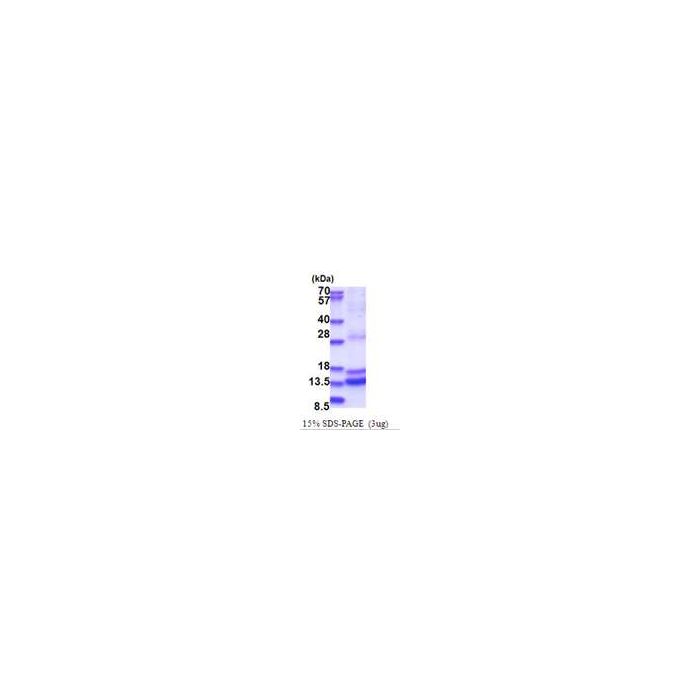| Product Name | CASP2, 348-452aa, Human |
|---|---|
| Description | CASP2 is a protein which is a member of the cysteine-aspartic acid protease (caspase) family. Sequential activation of caspases plays a central role in the execution-phase of cell apoptosis. Caspases exist as inactive proenzymes which undergo proteolytic processing at conserved aspartic residues to produce two subunits, large and small, that dimerize to form the active enzyme. The proteolytic cleavage of this protein is induced by a variety of apoptotic stimuli. Alternative splicing of this gene results in multiple transcript variants that encode different isoforms. Recombinant human CASP2 protein, fused to His-tag at N-terminus, was expressed in E.coli . |
| Synonyms | Caspase 2 isoform 1, CASP-2, ICH1, NEDD-2, NEDD2, PPP1R57 |
| Host | E. coli |
| Molecular Weight | 25.2 kDa (222aa) |
| Amino Acid Sequence | MGSSHHHHHH SSGLVPRGSH MAGKEKLPKM RLPTRSDMIC GYACLKGTAA MRNTKRGSWY IEALAQVFSE RACDMHVADM LVKVNALIKD REGYAPGTEF HRCKEMSEYC STLCRHLYLF PGHPPT |
| Tag | His-tag |
| Reactivity | Human |
| Applications | SDS-PAGE |
| Form | Liquid, in 20mM Tris-HCl buffer (pH 8.0) containing 0.4M Urea, 10% glycerol |
| Concentration | 1 mg/ml (determined by Bradford assay) |
| Purity | >80% by SDS-PAGE |
| Storage | Can be stored at +4C short term (1-2 weeks). For long term storage, aliquot and store at -2°C or -7°C. Avoid repeated freezing and thawing cycles. |
| References | Wang L., Miura M, et al. (1994) Cell 78:739-750 Droin N., Beauchemin M., et al. (2000) Cancer Res. 60:7039-7047 |
| Background | CASP2 is a protein which is a member of the cysteine-aspartic acid protease (caspase) family. Sequential activation of caspases plays a central role in the execution-phase of cell apoptosis. Caspases exist as inactive proenzymes which undergo proteolytic processing at conserved aspartic residues to produce two subunits, large and small, that dimerize to form the active enzyme. The proteolytic cleavage of this protein is induced by a variety of apoptotic stimuli. Alternative splicing of this gene results in multiple transcript variants that encode different isoforms. Recombinant human CASP2 protein, fused to His-tag at N-terminus, was expressed in E.coli . |
| Supplier | ARP |
All Research Products are sold for laboratory RESEARCH USE ONLY and ARE NOT TO BE USED FOR HUMAN OR ANIMAL THERAPEUTIC OR DIAGNOSTIC APPLICATIONS. The information presented is believed to be accurate; however, said information and products are offered without warranty or guarantee since the ultimate conditions of use and the variability of the materials treated are beyond our control. Nothing disclosed herein is to be construed as a recommendation to use our products in violation of any patents. ARP American Research Products, Inc. does not submit its products for regulatory review by any government body or other organization, and we do not validate them for clinical, therapeutic or diagnostic use, or for safety and effectiveness. You are solely responsible for making sure that the way you use the products complies with applicable laws, regulations and governmental policies and for obtaining all necessary approvals, intellectual property rights, licenses and permissions that you may need related to your use. Under no circumstances shall ARP American Research Products, Inc. be liable for damages, whether consequential, compensatory, incidental or special, strict liability or negligence, breach of warranty or any other theory arising out of the use of the products available from ARP American Research Products, Inc. Nothing contained herein warrants that the use of the products will not infringe on the claims of any patents covering the product itself or the use thereof in combination with other products or in the operation of any process. ARP American Research Products, Inc. disclaims any and all representations or warranties of any kind whatsoever, express or implied, including without limitation any implied warranties of merchantability or fitness for a particular purpose, of non-infringement, or regarding results obtained through the use of any product, whether arising from a statute or otherwise in law or from a course of performance, dealing or usage of trade.



